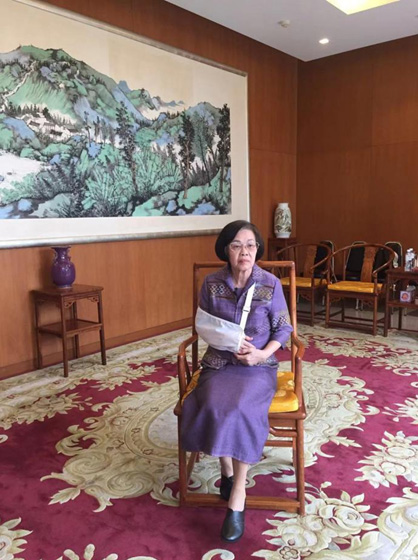"Hutong and yidian'er," Prapin Manomaivibool said, delightedly flexing her strong command of Mandarin with a pronounced northern accent.
Prapin, a demure Thai lady now in her seventies, holds a number of titles under her belt, which include the director of the Institute of Asian Studies and chair professor of the Chinese department at Chulalongkorn University. In addition, she has extensive research experience and publications in Chinese language, linguistics, and sinology.
"Now in Thailand, there are about 600,000 or 700,000 students learning Chinese," Prapin told China Daily Website in a recent interview.
Prapin's life is deeply rooted in ties with China, shaping the path for her dedication to Chinese language and education.
Born to parents from Chaozhou, South China's Guangdong province, Prapin was naturally exposed to Chaozhou dialect and Chinese traditions and customs at home as she grew up.
However, Prapindid not know anything about Mandarin, a far cry from the Chaozhou dialect she had been used to, until she started to learn Chinese in the United States back in 1967.
After securing her master's degree from Chulalongkorn University, one of the most prestigious higher education institutes in Thailand, the university considered setting up a Chinese program.
However, no one was available able to speak Chinese. Given Prapin's Chinese ancestry, she was sent to the United States to the University of Washington, learning Chinese from an array of eminent Chinese scholars like Li Fanggui.
Learning Mandarin from scratch, she found the tonal and the writing system in Chinese a challenge.
"I had to take the courses required for undergraduates, and I used the first two years to fulfill all these requirements; then in the fourth semester I got into the MA program in Chinese linguistics," Prapin recalled.
In 1975, the Thai scholar acquired her PhD in Asian Languages and Literature from the University of Washington and returned to Thailand, beginning her decades-long distinguished career of Chinese language education at her alma mater.
In 1983, Prapin came to China for the first time as a visiting scholar on a six-month academic exchange program between Chulalongkorn University and Peking University.
"Life was so simple and everyone was riding a bicycle. There were no traffic jams, and we had to use waihuiquan (foreign exchange certificates) as foreigners," the Thai scholar fondly recalled following her first visit to China.
As an expert in Chinese language and culture, Prapin has accompanied Thai Princess Maha Chakri Sirindhorn, a devoted China-Thailand cultural ambassador, on multiple visits to China, and said she has been to almost every Chinese city.
"Now everything is extremely different. Every year I went to China, there would be something different," said Prapin, hugely impressed with China's remarkable social progress.
Speaking of how Chinese culture is received by the general Thai public, Prapin shared that dumplings are popular in Thailand and Thai families enjoy celebrating traditional Chinese festivals such as the Spring Festival, the Dragon Boat Festival, and the Mid-Autumn Festival.
In addition, Prapin noted that many Thai people decorate their homes with Chinese furniture, Chinese ink paintings and calligraphy works.
 |
Prapin Manomaivibool, director of the Institute of Asian Studies and chair professor of the Chinese department at Chulalongkorn University, talks with China Daily Website at the China Cultural Center in Bangkok, September 21, 2019. [Photo by Feng Minghui/chinadaily.com.cn] |
In recent years, a number of Thai films such as A Little Thing We Called Love and Bad Genius have become big hits among young Chinese, while Chinese films and TV series are also popular among Thai youths.
"Students say they want to learn Chinese because they want to understand when they watch Chinese movies and TV series," Prapin said.
Noting the great influence of pop culture on the young generation in both countries, the scholar mentioned some of her students at Chulalongkorn University have been translating Chinese novels and the subtitles of Chinese animations, TV dramas and films into Thai.
"Since the world is getting smaller and smaller, it's much better if we all understand each other. If we know each other better, there will be less conflict," Prapin added, noting the Sino-Thai youth exchange programs are a successful example of such mutual understanding.
Yang Xiaoyu contributed to this story.